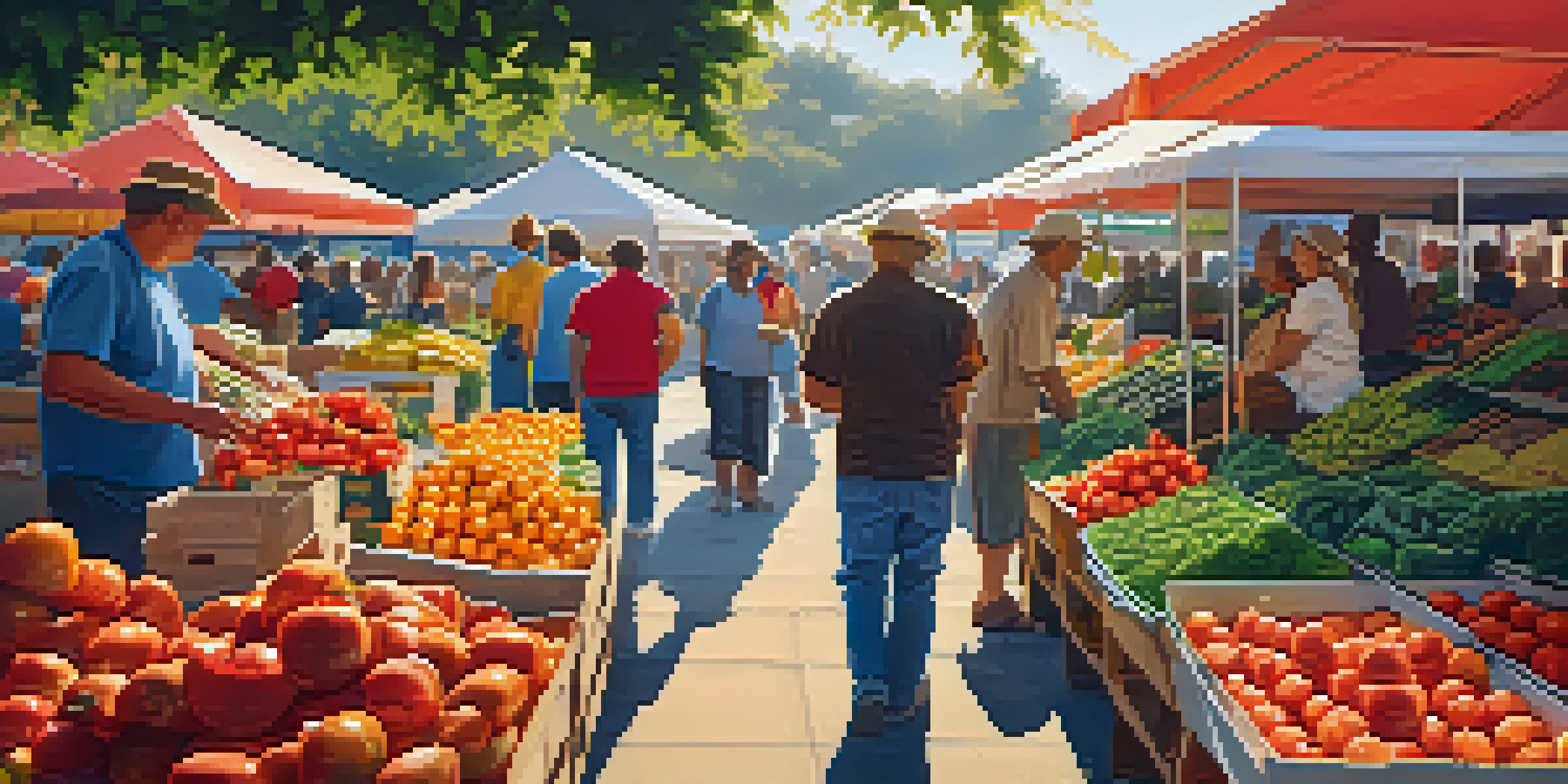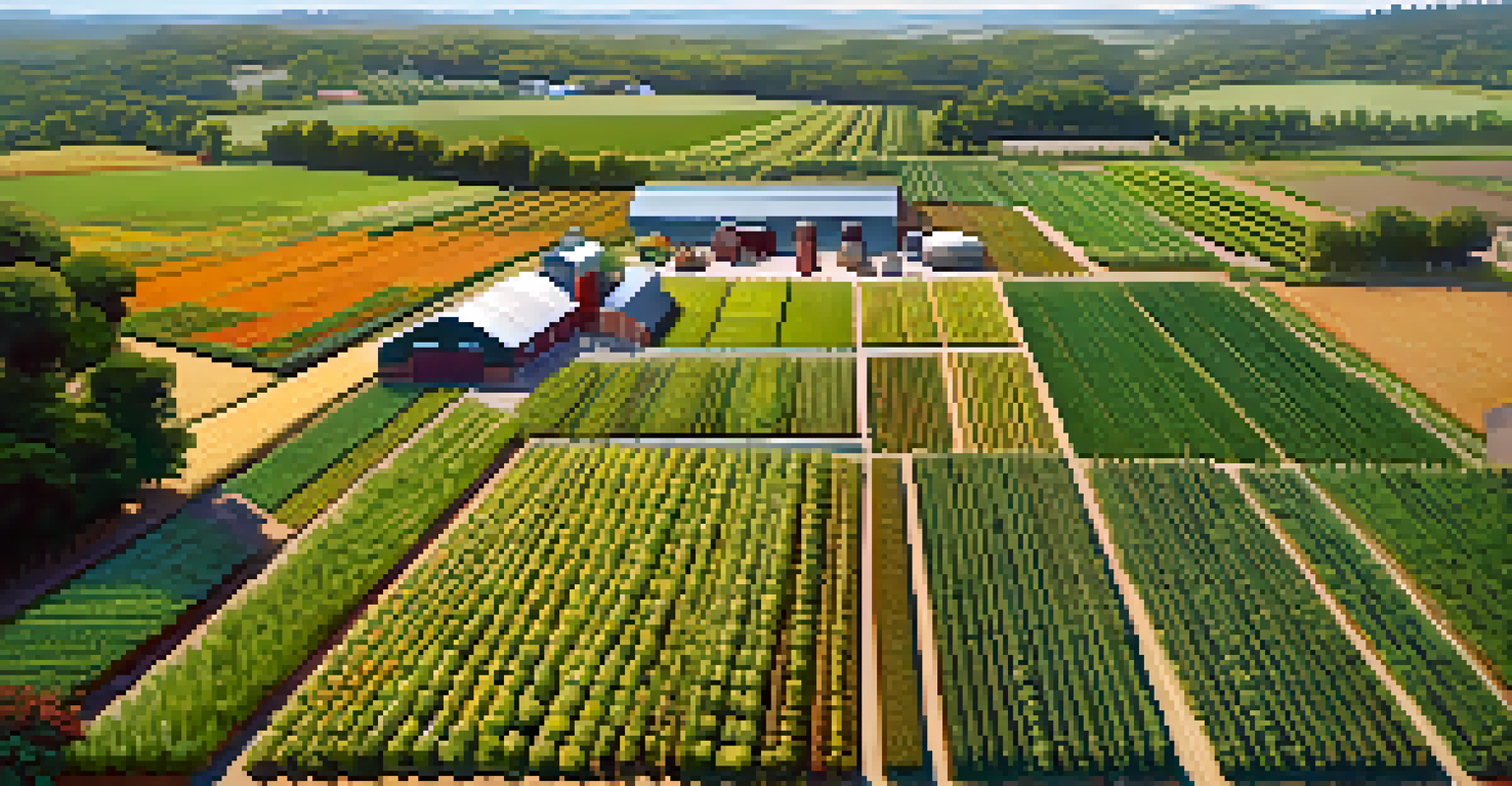Local Farmers Adapting to the Rise of Vegetarian Diets

The Shift Towards Vegetarian Diets: A Growing Trend
In recent years, vegetarian diets have surged in popularity, driven by health consciousness and environmental concerns. Many people are opting for plant-based meals, leading to a notable shift in consumer demand. This trend is not just a passing fad; it reflects a fundamental change in how we approach food and nutrition.
You are what you eat, so don't be fast, cheap, easy, or fake.
As more individuals choose to reduce or eliminate meat, local farmers are noticing a significant transformation in their customer base. They are increasingly finding that their traditional offerings no longer meet the needs of this new market. This shift presents both challenges and exciting opportunities for innovation in farming practices.
For instance, farmers are beginning to diversify their crops, growing more vegetables, legumes, and grains to cater to vegetarian customers. This adaptation not only helps farmers stay relevant but also encourages them to explore sustainable farming methods that benefit both the environment and their businesses.
Understanding Consumer Preferences in Local Communities
Local farmers are becoming more attuned to the preferences of their communities as the vegetarian movement grows. They are not just selling produce; they’re also engaging with customers to understand their needs and desires. This connection allows farmers to tailor their offerings, ensuring that they meet the evolving tastes of the market.

For example, some farmers are experimenting with heirloom varieties of vegetables and organic practices to attract health-conscious consumers. By focusing on quality and flavor, they can differentiate their products in a competitive marketplace. This approach fosters a sense of community and loyalty among customers who appreciate locally sourced food.
Vegetarian Diets Drive Market Change
The rise in vegetarian diets is transforming consumer demand, prompting farmers to adapt their crop offerings and farming practices.
Moreover, farmers are leveraging farmers' markets and local food festivals to showcase their vegetarian-friendly options. These events provide a platform for direct interaction with consumers, allowing farmers to share their stories and educate the public about their sustainable practices.
Innovative Crop Varieties: Meeting New Demands
As the vegetarian diet gains traction, local farmers are encouraged to explore innovative crop varieties. This might mean growing plant-based proteins like chickpeas and lentils, which are not only nutritious but also environmentally friendly. Such crops can play a crucial role in reducing reliance on animal-based protein sources.
Farming is a profession of hope.
Farmers are also looking at growing specialty crops, such as ethnic vegetables, that cater to diverse culinary preferences within their communities. This diversification not only boosts their income but also enriches the local food landscape. It’s a win-win situation: farmers thrive, and consumers enjoy a wider variety of fresh produce.
Additionally, experimenting with vertical farming and hydroponics is becoming increasingly popular among local farmers. These methods allow for year-round production of vegetables, ensuring that supply meets the growing demand for fresh, local, vegetarian options.
The Role of Education and Community Engagement
Education plays a pivotal role in helping local farmers adapt to the rise of vegetarian diets. Many farmers are now participating in workshops and training sessions focused on sustainable farming techniques and crop diversification. This knowledge empowers them to make informed decisions that align with current market trends.
Furthermore, community engagement is essential for fostering a supportive environment for local agriculture. Farmers are collaborating with local schools, health organizations, and cooking classes to promote the benefits of vegetarian diets. By doing so, they not only enhance their visibility but also inspire others to choose local produce.
Education Enhances Community Support
Local farmers are engaging in educational initiatives that foster community connections and promote the benefits of locally sourced, vegetarian-friendly food.
These educational efforts create a ripple effect, encouraging consumers to appreciate the value of fresh, locally grown food. When communities understand where their food comes from, they are more likely to support local farmers, solidifying a strong connection between consumers and producers.
Challenges Farmers Face Amidst Changing Diets
Despite the positive developments, local farmers face several challenges as they adapt to the rise of vegetarian diets. Transitioning to new crops requires investment in seeds, equipment, and knowledge, which can be daunting for small-scale farmers. Additionally, they must navigate the complexities of market demands and seasonal fluctuations.
Another significant challenge is competition from larger agricultural producers who can offer lower prices due to economies of scale. Local farmers need to find ways to differentiate their products and communicate the unique value of their locally sourced, sustainable offerings. This might involve storytelling and branding efforts to highlight their commitment to quality and community.
Moreover, as consumer preferences evolve, farmers must remain agile and responsive. Keeping up with trends requires continuous learning and adaptation, which can stretch their resources. However, those who succeed in overcoming these challenges can build a loyal customer base that values their products.
Sustainable Practices: A Path Forward for Local Farmers
As local farmers adapt to the rise of vegetarian diets, many are embracing sustainable practices that benefit both the environment and their business. Techniques such as crop rotation, organic farming, and permaculture not only enhance soil health but also ensure that farming remains viable for future generations. This commitment to sustainability resonates with consumers who are increasingly conscious of their food choices.
By adopting eco-friendly farming methods, local farmers can also reduce their carbon footprint, contributing to the fight against climate change. This commitment to the environment can be a powerful selling point, attracting customers who prioritize sustainability in their purchasing decisions. It creates a positive feedback loop where responsible practices lead to greater consumer support.
Sustainable Practices Boost Viability
Embracing sustainable farming methods not only benefits the environment but also helps local farmers meet consumer demands for quality and eco-friendly produce.
Moreover, sustainable practices often result in higher quality produce, which can command better prices in the market. As consumers become more discerning about where their food comes from, farmers who prioritize sustainability position themselves as leaders in the local food movement.
Looking Ahead: The Future of Local Farming and Vegetarianism
Looking ahead, the future of local farming appears promising as the vegetarian movement continues to gain momentum. Farmers who remain adaptable and open to change will likely thrive in this evolving landscape. By staying connected to their communities and being responsive to consumer preferences, they can ensure their relevance in a competitive market.
Additionally, as technology advances, farmers will have more tools at their disposal to enhance productivity and sustainability. From precision agriculture to online marketing, these innovations can help local farmers reach a broader audience and streamline their operations. Embracing technology while maintaining traditional values can create a unique farming identity.

Ultimately, the rise of vegetarian diets offers local farmers a chance to redefine their role in the food system. By focusing on quality, sustainability, and community engagement, they can foster a healthier future for both the planet and their businesses.